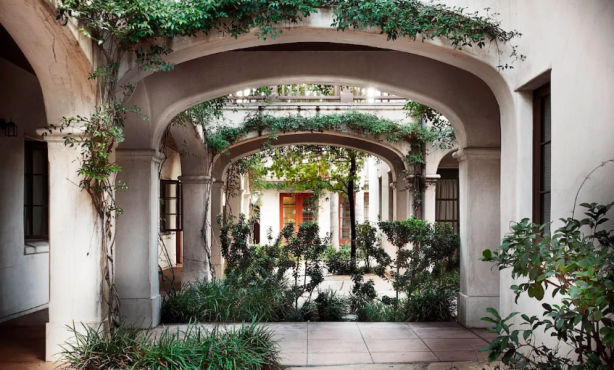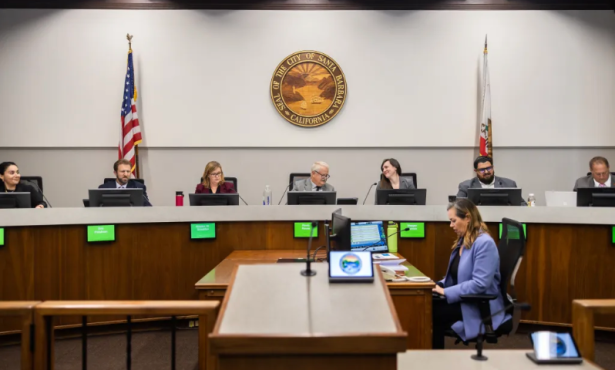Both Sides Now
Santa Barbara Man Views Israel-Palestine Conflict Firsthand
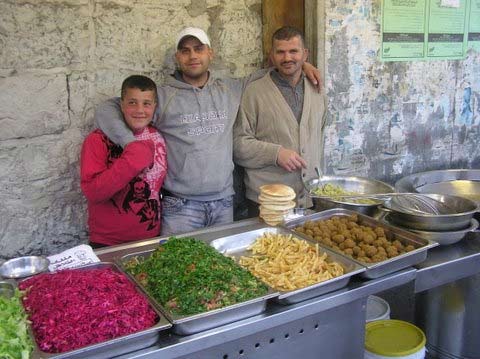
(Above: Falafel sellers on East Jerusalem sidewalk.)
The conflict between Israelis and Palestinians has raged since the state of Israel was founded in 1948. While news from that Middle Eastern region seems distant from the daily lives of those of us in California, one Santa Barbara man recently visited both Israel and Palestine and returned with a newfound perspective.
A Texas native, Frank Williams has lived in Santa Barbara for fifteen years, and has been an avid community volunteer since his retirement. He enjoys visiting Cottage Hospital with his dog, for example, providing pet therapy to inpatients. These visits have proved particularly popular in the pediatric ward. This willingness to reach out to others led Williams to travel to Israel and Palestine with a program sponsored by Interfaith Peace-Builders, which aims to familiarize Americans with the concerns and hopes of people living with the ongoing strife between Israel and Palestine. (The Washington D.C.-based program began in 2000, as an offshoot of the Fellowship of Reconciliation, which itself began in Germany in an effort to stymie the outbreak of World War I.) Traveling with a diverse group of Americans March 30 to April 12, Williams experienced both perspectives, from a rabbi in Hebron to a Palestinian man who founded a bi-partisan group called Combatants for Peace.
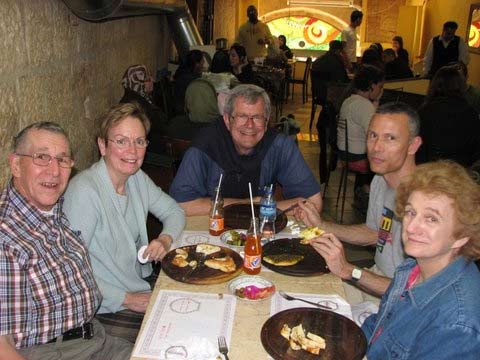
While violent acts may produce catchy headlines, the residents of towns continually bombarded with rockets have had enough, and there are both organizations and individuals working hard for peace-something Interfaith Peace-Builders tries hard to promote, one person at a time. Negotiations are in progress, with 2008 supposedly the year in which a lasting peace is cemented, but the outcome is doubtful. Many Israelis and Palestinians feel that it’s time for a different approach, and grassroots organizations working for peace at the local level have sprung up on both sides. Williams met with many of these organizations. While he admits that the Interfaith Peace-Builders do have a slight bias in favor of Palestinian interests in the region, he said that they’re simply trying to compensate for what he perceives as an underrepresentation of Palestinian viewpoints in the American media.
“We tend to get primarily one side of the story in the States, is my conclusion,” he said. “There’s usually at least one other side of the story, if not more.” The Palestinian viewpoint, he said, is more difficult to access. Israel maintains a freedom of the press which Williams compared favorably to that of the United States. The vast majority of Palestinian news is printed only in Arabic. Of the two major papers, one is approved by the Hamas party, the other by Fatah. They are often directed at attacking one another rather than reporting non-partisan news.
Although Williams said that this media underrepresentation “doesn’t mean that the Palestinian side is necessarily right,” he also said it’s easier for both individuals visiting from America and for American news correspondents to access Israeli viewpoints, and this has a large effect on the way the region’s conflicts are packaged for American consumption.
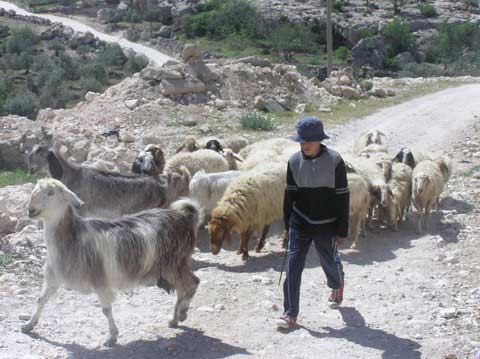
The Interfaith Peace-Builders trips aim to shortcut this typical media loop and reveal a behind-the-scenes picture for curious Americans. “[They] did not talk with anyone in an official military or government capacity,” he said, noting that the trip was focused on speaking with those whose lives are directly affected by the conflict, and who have no power to make official change.
And change is both needed and desired. Williams said he found evidence for this desire in a poll published in the English edition of the Jerusalem Post in which 73 percent of Israelis surveyed expressed a desire to have peace talks with Hamas-not later, but now. Sderot, an Israeli town near Gaza visited by the group, is continually assailed with rocket fire. While the rockets may be subpar in terms of military technology in comparison to weapons used in other parts of the world, they’re no less lethal.
Inhabitants of Sderot may very well have been a part of that 73 percent seeking an end to the bloodshed.
But according to Williams, one factor which may be stalling peace talks is simple fear. He met with five students from Hebrew University, the largest Jewish university in Jerusalem. He told the students that he’d just visited the Palestinian town of Ramallah, and asked whether they had ever been there. They hadn’t, because of security restrictions, even though it’s just six miles north of Jerusalem. One student expressed discomfort at the very idea of being in Ramallah. She was convinced that she would be a target.
While Williams said that the two Jewish Americans on the trip never felt threatened in Palestinian territory, he also admitted that Israelis might have been in more danger than a group of escorted United States citizens. However, it was his impression that the religious conflict is actually subordinate to territorial conflicts.
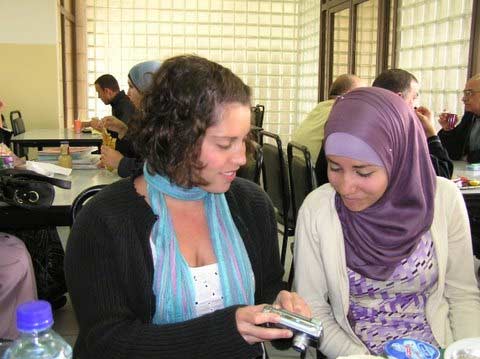
It surprised him, in fact, that while there he rarely heard either Israelis or Palestinians refer to the religion of the other side in a hostile way. Palestinians expressed no rancor toward Jews, and Israelis did not discuss any feelings they had about Muslims. Of course, while more secular citizens are concerned with territorial disputes rather than with the religious affiliations of those attacking their towns, devoutly religious elements of both societies insist on God’s support for their cause. “In order to believe either side,” one member of Williams’ group commented, “you have to believe that God’s a real estate agent.”
Whether religious or secular, the tension between the two groups is high. Even as tourists, the Interfaith Peace-Builders group were not isolated from the violence that can erupt at any moment. A trip they had planned to the Separation Wall between Israel and Gaza was cancelled because an Israeli VIP’s assistant had been shot by sniper fire earlier that day near the part of the wall Williams intended to visit. “It’s a vicious cycle,” Williams said, noting that each incident sparks a continuing round of violence despite both sides being worn out with the constant hostilities. However, he hopes that the situation will improve, and suggested that the involvement of American citizens will assist the process. “Just go over,” he said, “and see for yourself. For better or for worse, both sides want the U.S. to be involved,” he added. “I don’t know what the solution’s going to be, but the more people who go over there and see it for themselves, the more informed our decisions will be.”


